大学英语精读1课文翻译
现代大学英语精读1课本内容及翻译
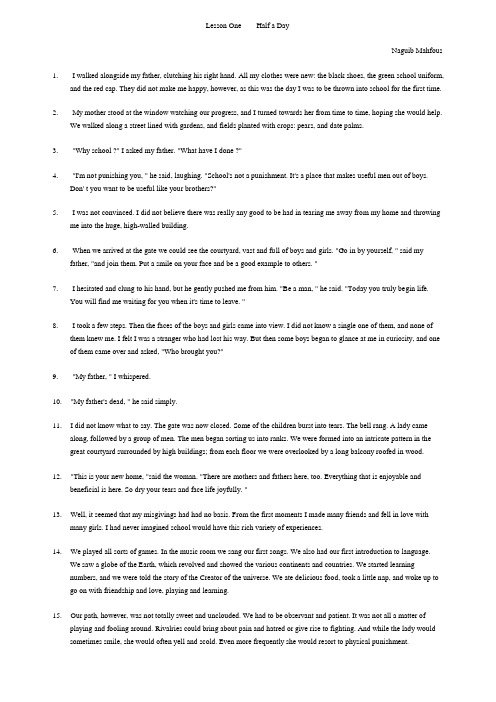
Lesson One Half a DayNaguib Mahfous1. I walked alongside my father, clutching his right hand. All my clothes were new: the black shoes, the green school uniform,and the red cap. They did not make me happy, however, as this was the day I was to be thrown into school for the first time.2. My mother stood at the window watching our progress, and I turned towards her from time to time, hoping she would help.We walked along a street lined with gardens, and fields planted with crops: pears, and date palms.3. "Why school ?" I asked my father. "What have I done ?"4. "I'm not punishing you, " he said, laughing. "School's not a punishment. It's a place that makes useful men out of boys.Don' t you want to be useful like your brothers?"5. I was not convinced. I did not believe there was really any good to be had in tearing me away from my home and throwingme into the huge, high-walled building.6. When we arrived at the gate we could see the courtyard, vast and full of boys and girls. "Go in by yourself, " said myfather, "and join them. Put a smile on your face and be a good example to others. "7. I hesitated and clung to his hand, but he gently pushed me from him. "Be a man, " he said. "Today you truly begin life.You will find me waiting for you when it's time to leave. "8. I took a few steps. Then the faces of the boys and girls came into view. I did not know a single one of them, and none ofthem knew me. I felt I was a stranger who had lost his way. But then some boys began to glance at me in curiosity, and one of them came over and asked, "Who brought you?"9. "My father, " I whispered.10. "My father's dead, " he said simply.11. I did not know what to say. The gate was now closed. Some of the children burst into tears. The bell rang. A lady camealong, followed by a group of men. The men began sorting us into ranks. We were formed into an intricate pattern in the great courtyard surrounded by high buildings; from each floor we were overlooked by a long balcony roofed in wood.12. "This is your new home, "said the woman. "There are mothers and fathers here, too. Everything that is enjoyable andbeneficial is here. So dry your tears and face life joyfully. "13. Well, it seemed that my misgivings had had no basis. From the first moments I made many friends and fell in love withmany girls. I had never imagined school would have this rich variety of experiences.14. We played all sorts of games. In the music room we sang our first songs. We also had our first introduction to language.We saw a globe of the Earth, which revolved and showed the various continents and countries. We started learningnumbers, and we were told the story of the Creator of the universe. We ate delicious food, took a little nap, and woke up to go on with friendship and love, playing and learning.15. Our path, however, was not totally sweet and unclouded. We had to be observant and patient. It was not all a matter ofplaying and fooling around. Rivalries could bring about pain and hatred or give rise to fighting. And while the lady would sometimes smile, she would often yell and scold. Even more frequently she would resort to physical punishment.16. In addition, the time for changing one' s mind was over and gone and there was no question of ever returning to theparadise of home. Nothing lay ahead of us but exertion, struggle, and perseverance. Those who were able took advantage of the opportunities for success and happiness that presented themselves.17. The bell rang, announcing the passing of the day and the end of work. The children rushed toward the gate, which wasopened again. I said goodbye to friends and sweethearts and passed through the gate. I looked around but found no trace of my father, who had promised to be there. I stepped aside to wait. When I had waited for a long time in vain, I decided to return home on my own. I walked a few steps, then came to a startled halt. Good Lord! Where was the street lined with gardens? Where had it disappeared to? When did all these cars invade it? And when did all these people come to rest on its surface? How did these hills of rubbish find their way to cover its sides? And where were the fields that bordered it? High buildings had taken over, the street was full of children, and disturbing noises shook the air. Here and there stood conjurers showing off their tricks or making snakes appear from baskets. Then there was a band announcing the opening of a circus, with clowns and weight lifters walking in front.18. Good God! I was in a daze. My head spun. I almost went crazy. How could all this have happened in half a day, betweenearly morning and sunset? I would find the answer at home with my father. But where was my home? I hurried towards the crossroads, because I remembered that I had to cross the street to reach our house, but the stream of cars would not let up.Extremely irritated, I wondered when I would be able to cross.19. I stood there a long time, until the young boy employed at the ironing shop on the corner came up to me.20. He stretched out his arm and said, "Grandpa, let me take you across."第一课半日1我走在父亲的一侧,牢牢地抓着他的右手。
现代大学英语精读1课本内容及翻译

Lesson Eight The Kindness of StrangersMike Mclntyre1. One summer I was driving from my home town of Tahoe City, Calif, to New Orleans. In the middle of the desert, I cameupon a young man standing by the roadside. He had his thumb out and held a gas can in his other hand. I drove right by him.There was a time in the country when you' d be considered a jerk if you passed by somebody in need. Now you are a fool for helping. With gangs, drug addicts, murderers, rapists, thieves lurking everywhere, "I don't want to get involved" has become a national motto.2. Several states later I was still thinking about the hitchhiker. Leaving him stranded in the desert did not bother me so much.What bothered me was how easily I had reached the decision. I never even lifted my foot off the accelerator.3. Does anyone stop any more? I wondered. I recalled Blanche DuBois's famous line: "I have always depended on thekindness of strangers." Could anyone rely on the kindness of strangers these days? One way to test this would be for a person to journey from coast to coast without any money, relying solely on the good will of his fellow Americans. What kind of Americans would he find? Who would feed him, shelter him, carry him down the road?4. The idea intrigued me.5. The week I turned 37, I realized that I had never taken a gamble in my life. So I decided to travel from the Pacific to theAtlantic without a penny. It would be a cashless journey through the land of the almighty dollar. I would only accept offers of rides, food and a place to rest my head. My final destination would be Cape Fear in North Carolina, a symbol of all the fears I'd have to conquer during the trip.6. I rose early on September 6, 1994, and headed for the Golden Gate Bridge with a 50-pound pack on my back and a signdisplaying my destination to passing vehicles: "America."7. For six weeks I hitched 82 rides and covered 4223 miles across 14 states. As I traveled, folks were always warning meabout someplace else. In Montana they told me to watch out for the cowboys in Wyoming, In Nebraska they said people would not be as nice in Iowa. Yet I was treated with kindness everywhere I went. I was amazed by people's readiness to help a stranger, even when it seemed to run contrary to their own best interests.8. One day in Nebraska a car pulled to the road shoulder. When I reached the window, I saw two little old ladies dressed intheir Sunday finest." I know you're not supposed to pick up hitchhikers, but it's so far between towns out here, you feel bad passing a person," said the driver, who introduced herself as Vi. I didn't know whether to kiss them or scold them forstopping. This woman was telling me she'd rather risk her life than feel bad about passing a stranger on the side of the road.9. Once when I was hitchhiking unsuccessfully in the rain, a trucker pulled over, locking his brakes so hard he skidded on thegrass shoulder. The driver told me he was once robbed at knifepoint by a hitchhiker. "But I hate to see a man stand out in the rain," he added. "People don't have no heart anymore."10. I found, however, that people were generally compassionate. Hearing I had no money and would take none, people boughtme food or shared whatever they happened to have with them. Those who had the least to give often gave the most. In Oregon a house painter named Mike noted the chilly weather and asked if I had a coat. When he learned that I had "a light one," he drove me to his house, and handed me a big green army-style jacket. A lumber-mill worker named Tim invited me to a simple dinner with his family in their shabby house. Then he offered me his tent. I refused, knowing it was probably one of the family's most valuable possessions. But Tim was determined that I have it, and finally I agreed to take it.11. I was grateful to all the people I met for their rides, their food, their shelter, and their gifts. But what I found most touchingwas the fact that they all did it as a matter of course.12. One day I walked into the chamber of commerce in Jamestown, Tenn. to find out about camping in the area. The executivedirector, Baxter Wilson, 59, handed me a brochure for a local campground. Seeing that it cost $12, I replied, "No, that's all right. I'll try something else." Then he saw my backpack. "Most people around here will let you pitch a tent on their land, if that's what you want," he said. Now we're talking, I thought. "Any particular direction?" I asked. "Tell you what. I've got a big farm about ten miles south of here. If you're here at 5:30, you can ride with me."13. I accepted, and we drove out to a magnificent country house. Suddenly I realized he'd invited me to spend the night in hishome. His wife, Carol, a seventh-grade science teacher, was cooking a pot roast when we walked into the kitchen. Baxter explained that local folks were "mountain stay-at-home people" who rarely entertained in their house. "When we do," he said, "it's usually kin." This revelation made my night there all the more special.14. The next morning when I came downstairs, Carol asked if I'd come to their school and talk to her class about my trip. Iagreed, and before long had been scheduled to talk to every class in the school. The kids were attentive and kept asking all kinds of questions: Where were people the kindest? How many pairs of shoes did you have? Did anybody try to run you over? Did you fall in love with someone? What were you most afraid of?15. Although I hadn't planned it this way, I discovered that a patriotic tone ran through the talks I gave that afternoon. I told thestudents how my faith in America had been renewed. I told them how proud I was to live in a country where people were still willing to help. I told them that the question I had had in mind when I planned this journey was now clearly answered.In spite of everything, you can still depend on the kindness of strangers.第八课陌生人的仁慈1一个夏天,我正驱车从我的家乡加利福尼亚州的塔霍湖市前往新奥尔良。
现代大学英语精读1课文翻译
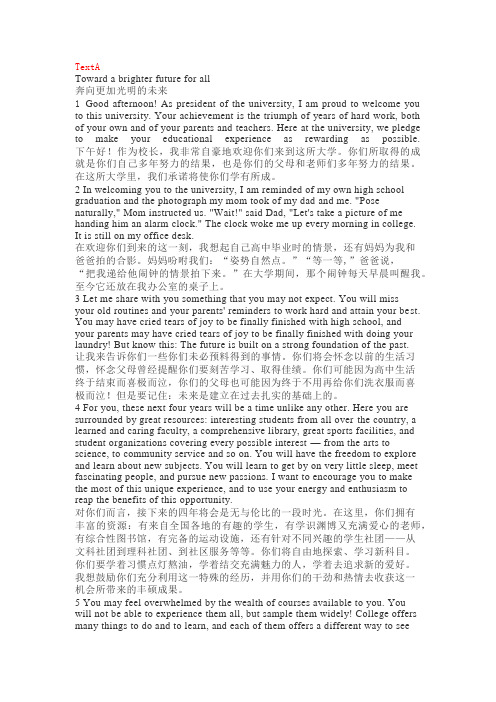
TextAToward a brighter future for all奔向更加光明的未来1 Good afternoon! As president of the university, I am proud to welcome you to this university. Your achievement is the triumph of years of hard work, both of your own and of your parents and teachers. Here at the university, we pledge to make your educational experience as rewarding as possible. 下午好!作为校长,我非常自豪地欢迎你们来到这所大学。
你们所取得的成就是你们自己多年努力的结果,也是你们的父母和老师们多年努力的结果。
在这所大学里,我们承诺将使你们学有所成。
2 In welcoming you to the university, I am reminded of my own high school graduation and the photograph my mom took of my dad and me. "Pose naturally," Mom instructed us. "Wait!" said Dad, "Let's take a picture of me handing him an alarm clock." The clock woke me up every morning in college.It is still on my office desk.在欢迎你们到来的这一刻,我想起自己高中毕业时的情景,还有妈妈为我和爸爸拍的合影。
大学英语精读1课文翻译全
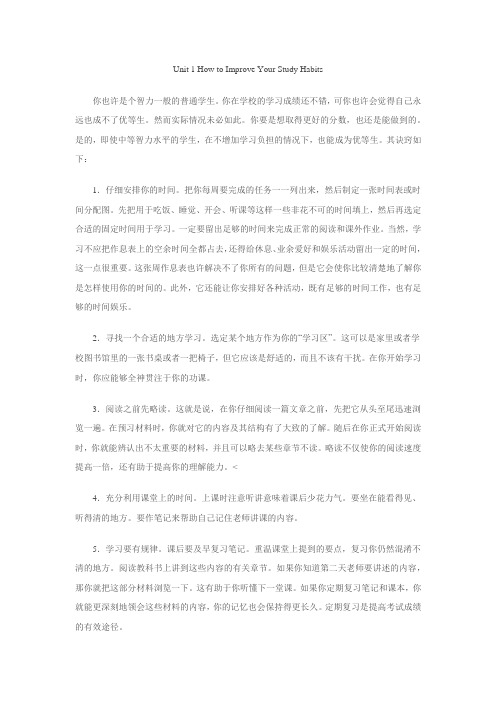
Unit 1 How to Improve Your Study Habits你也许是个智力一般的普通学生。
你在学校的学习成绩还不错,可你也许会觉得自己永远也成不了优等生。
然而实际情况未必如此。
你要是想取得更好的分数,也还是能做到的。
是的,即使中等智力水平的学生,在不增加学习负担的情况下,也能成为优等生。
其诀窍如下:1.仔细安排你的时间。
把你每周要完成的任务一一列出来,然后制定一张时间表或时间分配图。
先把用于吃饭、睡觉、开会、听课等这样一些非花不可的时间填上,然后再选定合适的固定时间用于学习。
一定要留出足够的时间来完成正常的阅读和课外作业。
当然,学习不应把作息表上的空余时间全都占去,还得给休息、业余爱好和娱乐活动留出一定的时间,这一点很重要。
这张周作息表也许解决不了你所有的问题,但是它会使你比较清楚地了解你是怎样使用你的时间的。
此外,它还能让你安排好各种活动,既有足够的时间工作,也有足够的时间娱乐。
2.寻找一个合适的地方学习。
选定某个地方作为你的“学习区”。
这可以是家里或者学校图书馆里的一张书桌或者一把椅子,但它应该是舒适的,而且不该有干扰。
在你开始学习时,你应能够全神贯注于你的功课。
3.阅读之前先略读。
这就是说,在你仔细阅读一篇文章之前,先把它从头至尾迅速浏览一遍。
在预习材料时,你就对它的内容及其结构有了大致的了解。
随后在你正式开始阅读时,你就能辨认出不太重要的材料,并且可以略去某些章节不读。
略读不仅使你的阅读速度提高一倍,还有助于提高你的理解能力。
<4.充分利用课堂上的时间。
上课时注意听讲意味着课后少花力气。
要坐在能看得见、听得清的地方。
要作笔记来帮助自己记住老师讲课的内容。
5.学习要有规律。
课后要及早复习笔记。
重温课堂上提到的要点,复习你仍然混淆不清的地方。
阅读教科书上讲到这些内容的有关章节。
如果你知道第二天老师要讲述的内容,那你就把这部分材料浏览一下。
这有助于你听懂下一堂课。
如果你定期复习笔记和课本,你就能更深刻地领会这些材料的内容,你的记忆也会保持得更长久。
(完整)现代大学英语精读1 课后翻译

Unit11。
他们利用我们求助无门的困境把我们公司接管了。
They took advantage of our helpless situation and took over our company.2. 虽然我们面前仍有困难,但我肯定我们中国人有智慧靠自己实现国家的和平统一。
Although there are still difficulties ahead of us, I am sure that we Chinese people will have the wisdom to bring about the peaceful unification of our country on our own3. 只强调国内生产总值是错误的,它会引起很多严重问题。
It is wrong to put emphasis on nothing but GDP. It will give rise to many serious problems.4. 他喜欢炫耀他的财富,但是这完全是徒劳的,人们仍然像躲避毒药那样躲避他。
He loves to show off his wealth, but that is all in vain。
People still avoid him as though he were poison。
5. 他不久就爱上了这个村子。
他决心和村民一起把这个地方变成一个花园。
He soon fell in love with the village and was determined to make it a beautiful garden together with other villagers.6。
我们必须花更多的钱来和全球气温上升作斗争。
另外,我认为我们还必须采用严厉的法律措施.这不只是一个钱的问题。
We must spend more money fighting against global warming. In addition, we must resort to tough laws. It is not just a matter of money。
现代大学英语精读1课文翻译
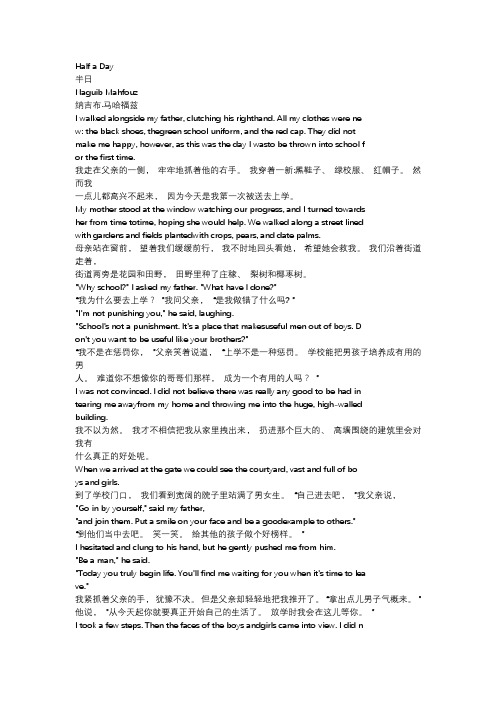
Half a Day半日Naguib Mahfouz纳吉布·马哈福兹I walked alongside my father, clutching his righthand. All my clothes were new: the black shoes, thegreen school uniform, and the red cap. They did notmake me happy, however, as this was the day I wasto be thrown into school for the first time.我走在父亲的一侧,牢牢地抓着他的右手。
我穿着一新:黑鞋子、绿校服、红帽子。
然而我一点儿都高兴不起来,因为今天是我第一次被送去上学。
My mother stood at the window watching our progress, and I turned towardsher from time totime, hoping she would help. We walked along a street linedwith gardens and fields plantedwith crops, pears, and date palms.母亲站在窗前,望着我们缓缓前行,我不时地回头看她,希望她会救我。
我们沿着街道走着,街道两旁是花园和田野,田野里种了庄稼、梨树和椰枣树。
"Why school?" I asked my father. "What have I done?"“我为什么要去上学?”我问父亲,“是我做错了什么吗? ”"I'm not punishing you," he said, laughing."School's not a punishment. It's a place that makesuseful men out of boys. Don't you want to be useful like your brothers?"“我不是在惩罚你,”父亲笑着说道,“上学不是一种惩罚。
现代大学英语精读1课本内容及翻译
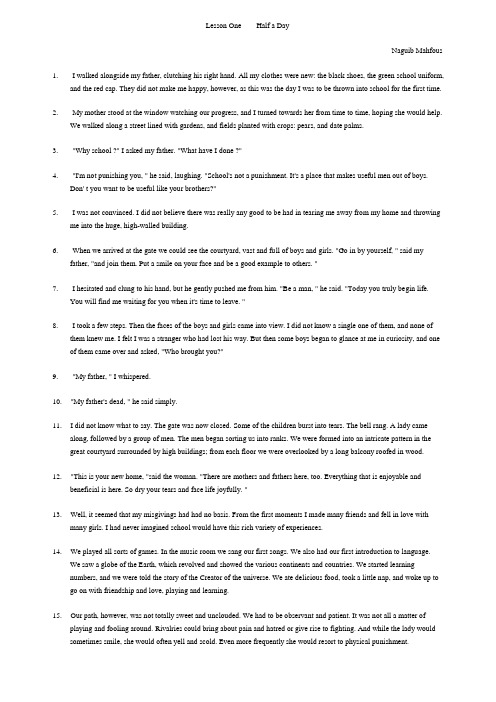
Lesson One Half a DayNaguib Mahfous1. I walked alongside my father, clutching his right hand. All my clothes were new: the black shoes, the green school uniform,and the red cap. They did not make me happy, however, as this was the day I was to be thrown into school for the first time.2. My mother stood at the window watching our progress, and I turned towards her from time to time, hoping she would help.We walked along a street lined with gardens, and fields planted with crops: pears, and date palms.3. "Why school ?" I asked my father. "What have I done ?"4. "I'm not punishing you, " he said, laughing. "School's not a punishment. It's a place that makes useful men out of boys.Don' t you want to be useful like your brothers?"5. I was not convinced. I did not believe there was really any good to be had in tearing me away from my home and throwingme into the huge, high-walled building.6. When we arrived at the gate we could see the courtyard, vast and full of boys and girls. "Go in by yourself, " said myfather, "and join them. Put a smile on your face and be a good example to others. "7. I hesitated and clung to his hand, but he gently pushed me from him. "Be a man, " he said. "Today you truly begin life.You will find me waiting for you when it's time to leave. "8. I took a few steps. Then the faces of the boys and girls came into view. I did not know a single one of them, and none ofthem knew me. I felt I was a stranger who had lost his way. But then some boys began to glance at me in curiosity, and one of them came over and asked, "Who brought you?"9. "My father, " I whispered.10. "My father's dead, " he said simply.11. I did not know what to say. The gate was now closed. Some of the children burst into tears. The bell rang. A lady camealong, followed by a group of men. The men began sorting us into ranks. We were formed into an intricate pattern in the great courtyard surrounded by high buildings; from each floor we were overlooked by a long balcony roofed in wood.12. "This is your new home, "said the woman. "There are mothers and fathers here, too. Everything that is enjoyable andbeneficial is here. So dry your tears and face life joyfully. "13. Well, it seemed that my misgivings had had no basis. From the first moments I made many friends and fell in love withmany girls. I had never imagined school would have this rich variety of experiences.14. We played all sorts of games. In the music room we sang our first songs. We also had our first introduction to language.We saw a globe of the Earth, which revolved and showed the various continents and countries. We started learningnumbers, and we were told the story of the Creator of the universe. We ate delicious food, took a little nap, and woke up to go on with friendship and love, playing and learning.15. Our path, however, was not totally sweet and unclouded. We had to be observant and patient. It was not all a matter ofplaying and fooling around. Rivalries could bring about pain and hatred or give rise to fighting. And while the lady would sometimes smile, she would often yell and scold. Even more frequently she would resort to physical punishment.16. In addition, the time for changing one' s mind was over and gone and there was no question of ever returning to theparadise of home. Nothing lay ahead of us but exertion, struggle, and perseverance. Those who were able took advantage of the opportunities for success and happiness that presented themselves.17. The bell rang, announcing the passing of the day and the end of work. The children rushed toward the gate, which wasopened again. I said goodbye to friends and sweethearts and passed through the gate. I looked around but found no trace of my father, who had promised to be there. I stepped aside to wait. When I had waited for a long time in vain, I decided to return home on my own. I walked a few steps, then came to a startled halt. Good Lord! Where was the street lined with gardens? Where had it disappeared to? When did all these cars invade it? And when did all these people come to rest on its surface? How did these hills of rubbish find their way to cover its sides? And where were the fields that bordered it? High buildings had taken over, the street was full of children, and disturbing noises shook the air. Here and there stood conjurers showing off their tricks or making snakes appear from baskets. Then there was a band announcing the opening of a circus, with clowns and weight lifters walking in front.18. Good God! I was in a daze. My head spun. I almost went crazy. How could all this have happened in half a day, betweenearly morning and sunset? I would find the answer at home with my father. But where was my home? I hurried towards the crossroads, because I remembered that I had to cross the street to reach our house, but the stream of cars would not let up.Extremely irritated, I wondered when I would be able to cross.19. I stood there a long time, until the young boy employed at the ironing shop on the corner came up to me.20. He stretched out his arm and said, "Grandpa, let me take you across."第一课半日1我走在父亲的一侧,牢牢地抓着他的右手。
大学英语精读1第三版课文英汉对照
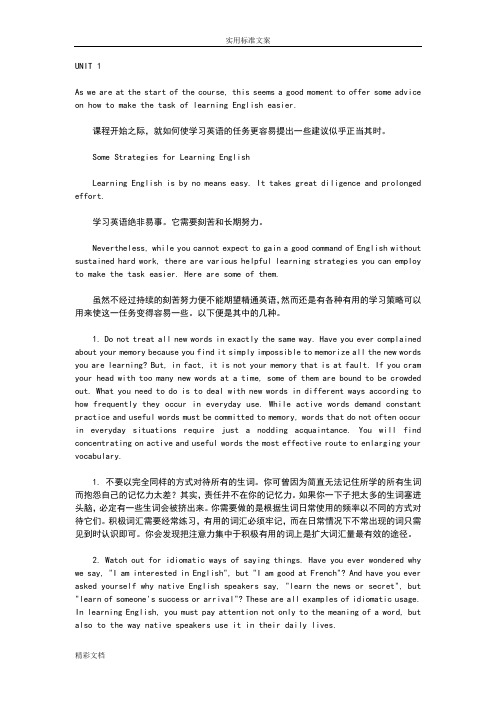
UNIT 1As we are at the start of the course, this seems a good moment to offer some advice on how to make the task of learning English easier.课程开始之际,就如何使学习英语的任务更容易提出一些建议似乎正当其时。
Some Strategies for Learning EnglishLearning English is by no means easy. It takes great diligence and prolonged effort.学习英语绝非易事。
它需要刻苦和长期努力。
Nevertheless, while you cannot expect to gain a good command of English without sustained hard work, there are various helpful learning strategies you can employ to make the task easier. Here are some of them.虽然不经过持续的刻苦努力便不能期望精通英语,然而还是有各种有用的学习策略可以用来使这一任务变得容易一些。
以下便是其中的几种。
1. Do not treat all new words in exactly the same way. Have you ever complained about your memory because you find it simply impossible to memorize all the new words you are learning? But, in fact, it is not your memory that is at fault. If you cram your head with too many new words at a time, some of them are bound to be crowded out. What you need to do is to deal with new words in different ways according to how frequently they occur in everyday use. While active words demand constant practice and useful words must be committed to memory, words that do not often occur in everyday situations require just a nodding acquaintance. You will find concentrating on active and useful words the most effective route to enlarging your vocabulary.1. 不要以完全同样的方式对待所有的生词。
现代大学英语精读1(带译文)

现代大学英语精读1(带译文)一、课文背景本单元选自美国作家埃德加·爱伦·坡的短篇小说《黑猫》。
故事讲述了一位酗酒成性的男子,因虐待并杀害自己收养的黑猫,最终被黑猫的鬼魂复仇,自己也在精神崩溃中走向毁灭。
这篇小说通过恐怖、悬疑的情节,揭示了人性的黑暗面和道德的沦丧。
二、课文概要1. 故事发生在美国一个偏远的农场,主人公是一位酗酒成性的男子。
他收养了一只黑猫,取名普卢托。
随着时间的推移,他对黑猫产生了强烈的依赖,甚至将它视为自己的朋友。
2. 有一天,男子在醉酒后用刀划伤了普卢托的左眼。
酒醒后,他为自己的行为感到愧疚,但为了掩盖罪行,他决定将黑猫埋在院子里。
3. 在黑猫被埋葬的当晚,男子听到了黑猫的哀嚎声。
他开始怀疑自己的行为,精神状态逐渐恶化。
4. 为了摆脱黑猫的纠缠,男子决定离开农场,搬到城里居住。
然而,他发现黑猫的鬼魂无处不在,甚至出现在他的新家中。
5. 最终,男子在精神崩溃中走向毁灭,被黑猫的鬼魂复仇。
三、课文难点解析1. 生词短语(1)酗酒成性:drunkard,意为“酒鬼”。
(2)虐待:torture,意为“折磨”。
(3)复仇:revenge,意为“报复”。
2. 句子结构(1)It was in the early part of the evening that I first became aware of the symptoms of my little trouble.本句中,It wasthat为强调句型,强调时间状语“in the early part of the evening”。
symptoms意为“症状”,指男子开始意识到自己的精神状态出现问题。
(2)I resolved to get rid of the cat at once.本句中,resolve to do sth. 意为“决定做某事”,get rid of意为“摆脱”。
男子决定立刻摆脱黑猫。
大学英语精读1课文翻译
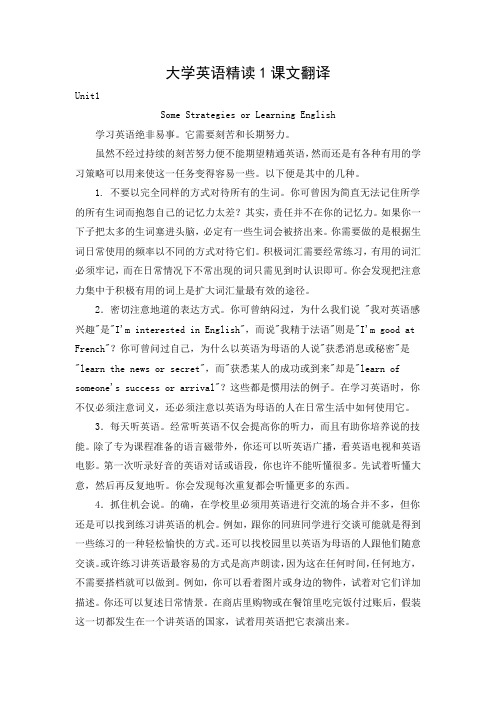
大学英语精读1课文翻译Unit1Some Strategies or Learning English学习英语绝非易事。
它需要刻苦和长期努力。
虽然不经过持续的刻苦努力便不能期望精通英语,然而还是有各种有用的学习策略可以用来使这一任务变得容易一些。
以下便是其中的几种。
1. 不要以完全同样的方式对待所有的生词。
你可曾因为简直无法记住所学的所有生词而抱怨自己的记忆力太差?其实,责任并不在你的记忆力。
如果你一下子把太多的生词塞进头脑,必定有一些生词会被挤出来。
你需要做的是根据生词日常使用的频率以不同的方式对待它们。
积极词汇需要经常练习,有用的词汇必须牢记,而在日常情况下不常出现的词只需见到时认识即可。
你会发现把注意力集中于积极有用的词上是扩大词汇量最有效的途径。
2.密切注意地道的表达方式。
你可曾纳闷过,为什么我们说 "我对英语感兴趣"是"I'm interested in English",而说"我精于法语"则是"I'm good at French"?你可曾问过自己,为什么以英语为母语的人说"获悉消息或秘密"是"learn the news or secret",而"获悉某人的成功或到来"却是"learn of someone's success or arrival"?这些都是惯用法的例子。
在学习英语时,你不仅必须注意词义,还必须注意以英语为母语的人在日常生活中如何使用它。
3.每天听英语。
经常听英语不仅会提高你的听力,而且有助你培养说的技能。
除了专为课程准备的语言磁带外,你还可以听英语广播,看英语电视和英语电影。
第一次听录好音的英语对话或语段,你也许不能听懂很多。
先试着听懂大意,然后再反复地听。
你会发现每次重复都会听懂更多的东西。
现代大学英语精读1(第二版)1-9课文翻译
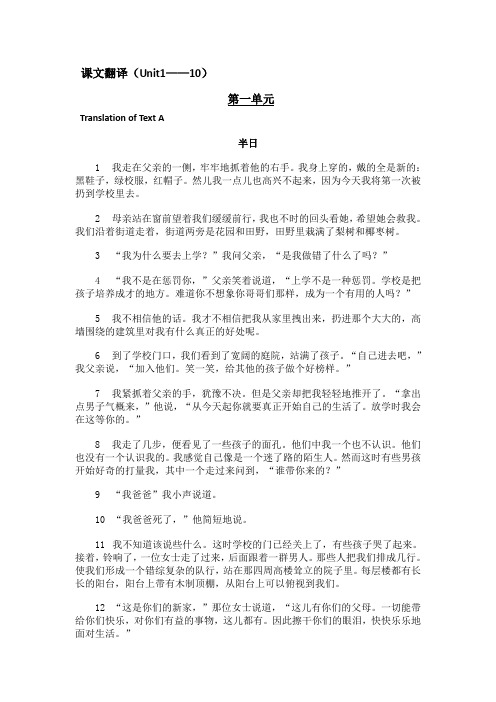
课文翻译(Unit1——10)第一单元Translation of Text A半日1我走在父亲的一侧,牢牢地抓着他的右手。
我身上穿的,戴的全是新的:黑鞋子,绿校服,红帽子。
然儿我一点儿也高兴不起来,因为今天我将第一次被扔到学校里去。
2母亲站在窗前望着我们缓缓前行,我也不时的回头看她,希望她会救我。
我们沿着街道走着,街道两旁是花园和田野,田野里栽满了梨树和椰枣树。
3“我为什么要去上学?”我问父亲,“是我做错了什么了吗?”4“我不是在惩罚你,”父亲笑着说道,“上学不是一种惩罚。
学校是把孩子培养成才的地方。
难道你不想象你哥哥们那样,成为一个有用的人吗?”5我不相信他的话。
我才不相信把我从家里拽出来,扔进那个大大的,高墙围绕的建筑里对我有什么真正的好处呢。
6到了学校门口,我们看到了宽阔的庭院,站满了孩子。
“自己进去吧,”我父亲说,“加入他们。
笑一笑,给其他的孩子做个好榜样。
”7我紧抓着父亲的手,犹豫不决。
但是父亲却把我轻轻地推开了。
“拿出点男子气概来,”他说,“从今天起你就要真正开始自己的生活了。
放学时我会在这等你的。
”8我走了几步,便看见了一些孩子的面孔。
他们中我一个也不认识。
他们也没有一个认识我的。
我感觉自己像是一个迷了路的陌生人。
然而这时有些男孩开始好奇的打量我,其中一个走过来问到,“谁带你来的?”9“我爸爸”我小声说道。
10“我爸爸死了,”他简短地说。
11我不知道该说些什么。
这时学校的门已经关上了,有些孩子哭了起来。
接着,铃响了,一位女士走了过来,后面跟着一群男人。
那些人把我们排成几行。
使我们形成一个错综复杂的队行,站在那四周高楼耸立的院子里。
每层楼都有长长的阳台,阳台上带有木制顶棚,从阳台上可以俯视到我们。
12“这是你们的新家,”那位女士说道,“这儿有你们的父母。
一切能带给你们快乐,对你们有益的事物,这儿都有。
因此擦干你们的眼泪,快快乐乐地面对生活。
”13这样看来我之前的顾虑都是毫无根据的了。
(完整word版)现代大学英语精读1课本内容及翻译
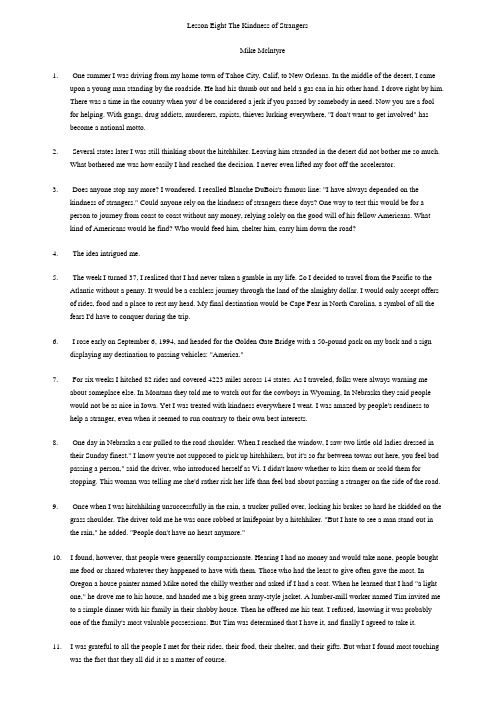
Lesson Eight The Kindness of StrangersMike Mclntyre1. One summer I was driving from my home town of Tahoe City, Calif, to New Orleans. In the middle of the desert, I cameupon a young man standing by the roadside. He had his thumb out and held a gas can in his other hand. I drove right by him.There was a time in the country when you' d be considered a jerk if you passed by somebody in need. Now you are a fool for helping. With gangs, drug addicts, murderers, rapists, thieves lurking everywhere, "I don't want to get involved" has become a national motto.2. Several states later I was still thinking about the hitchhiker. Leaving him stranded in the desert did not bother me so much.What bothered me was how easily I had reached the decision. I never even lifted my foot off the accelerator.3. Does anyone stop any more? I wondered. I recalled Blanche DuBois's famous line: "I have always depended on thekindness of strangers." Could anyone rely on the kindness of strangers these days? One way to test this would be for a person to journey from coast to coast without any money, relying solely on the good will of his fellow Americans. What kind of Americans would he find? Who would feed him, shelter him, carry him down the road?4. The idea intrigued me.5. The week I turned 37, I realized that I had never taken a gamble in my life. So I decided to travel from the Pacific to theAtlantic without a penny. It would be a cashless journey through the land of the almighty dollar. I would only accept offers of rides, food and a place to rest my head. My final destination would be Cape Fear in North Carolina, a symbol of all the fears I'd have to conquer during the trip.6. I rose early on September 6, 1994, and headed for the Golden Gate Bridge with a 50-pound pack on my back and a signdisplaying my destination to passing vehicles: "America."7. For six weeks I hitched 82 rides and covered 4223 miles across 14 states. As I traveled, folks were always warning meabout someplace else. In Montana they told me to watch out for the cowboys in Wyoming, In Nebraska they said people would not be as nice in Iowa. Yet I was treated with kindness everywhere I went. I was amazed by people's readiness to help a stranger, even when it seemed to run contrary to their own best interests.8. One day in Nebraska a car pulled to the road shoulder. When I reached the window, I saw two little old ladies dressed intheir Sunday finest." I know you're not supposed to pick up hitchhikers, but it's so far between towns out here, you feel bad passing a person," said the driver, who introduced herself as Vi. I didn't know whether to kiss them or scold them forstopping. This woman was telling me she'd rather risk her life than feel bad about passing a stranger on the side of the road.9. Once when I was hitchhiking unsuccessfully in the rain, a trucker pulled over, locking his brakes so hard he skidded on thegrass shoulder. The driver told me he was once robbed at knifepoint by a hitchhiker. "But I hate to see a man stand out in the rain," he added. "People don't have no heart anymore."10. I found, however, that people were generally compassionate. Hearing I had no money and would take none, people boughtme food or shared whatever they happened to have with them. Those who had the least to give often gave the most. In Oregon a house painter named Mike noted the chilly weather and asked if I had a coat. When he learned that I had "a light one," he drove me to his house, and handed me a big green army-style jacket. A lumber-mill worker named Tim invited me to a simple dinner with his family in their shabby house. Then he offered me his tent. I refused, knowing it was probably one of the family's most valuable possessions. But Tim was determined that I have it, and finally I agreed to take it.11. I was grateful to all the people I met for their rides, their food, their shelter, and their gifts. But what I found most touchingwas the fact that they all did it as a matter of course.12. One day I walked into the chamber of commerce in Jamestown, Tenn. to find out about camping in the area. The executivedirector, Baxter Wilson, 59, handed me a brochure for a local campground. Seeing that it cost $12, I replied, "No, that's all right. I'll try something else." Then he saw my backpack. "Most people around here will let you pitch a tent on their land, if that's what you want," he said. Now we're talking, I thought. "Any particular direction?" I asked. "Tell you what. I've got a big farm about ten miles south of here. If you're here at 5:30, you can ride with me."13. I accepted, and we drove out to a magnificent country house. Suddenly I realized he'd invited me to spend the night in hishome. His wife, Carol, a seventh-grade science teacher, was cooking a pot roast when we walked into the kitchen. Baxter explained that local folks were "mountain stay-at-home people" who rarely entertained in their house. "When we do," he said, "it's usually kin." This revelation made my night there all the more special.14. The next morning when I came downstairs, Carol asked if I'd come to their school and talk to her class about my trip. Iagreed, and before long had been scheduled to talk to every class in the school. The kids were attentive and kept asking all kinds of questions: Where were people the kindest? How many pairs of shoes did you have? Did anybody try to run you over? Did you fall in love with someone? What were you most afraid of?15. Although I hadn't planned it this way, I discovered that a patriotic tone ran through the talks I gave that afternoon. I told thestudents how my faith in America had been renewed. I told them how proud I was to live in a country where people were still willing to help. I told them that the question I had had in mind when I planned this journey was now clearly answered.In spite of everything, you can still depend on the kindness of strangers.第八课陌生人的仁慈1一个夏天,我正驱车从我的家乡加利福尼亚州的塔霍湖市前往新奥尔良。
现代大学英语精读1课文翻译1

现代大学英语精读1课文翻译Unit 1 Your college years1你可曾考虑过作为一个大学生你生活中正在发生和即将发生的变化?你可曾想到过大学时代教授们以及其他教职工为了你的成长和发展制定了目标?你可曾注意过你在从青少年渐渐成人的过程中会发生某些变化?尽管大学生很少想这些,但是在大学生时代很可能会发生一些主要的变化。
2在这段时期,学生们正经受自我认同危机,他们努力要了解自己的身份,掌握自身的优缺点。
当然,优缺点他们兼而有之,且两者都为数不少。
重要的是人们如何看待自己,其他人又如何看待他们。
皮尔斯和兰多曾在一篇文章中探讨了爱立信在《国际社会百科全书》中有关理论,根据他们的观点,性格特征是由先天基因(即父母的遗传物质)所决定,由外部环境而形成,并受偶然事件的影响的。
人们受环境的影响,反过来也影响他们的环境。
人们如何看待自己扮演的这两个角色无疑正是他们性格特征的部分表现。
3学生们经历自我认同危机的时候,他们也开始渐渐独立,但是可能仍然非常依赖父母。
这种介于独立与依赖之间的冲突常常发生在青少年末期。
事实上,这种冲突很可能因为他们选择继续接受大学教育而愈发激烈。
高中一毕业,一些学生便会立即走入社会开始工作。
这种选择的结果就是他们可能他们在经济上获得独立。
但是大学生已经选择了用几年的时间继续掌握新知并且发展自我,因此他们在一定程度上还要依赖父母。
41984年4月杰利弗·A·霍夫曼在《心理咨询杂志》上发表了《即将成人的青年与父母的心理距离》,文章中他提及了人与父母产生心理距离的四个不同方面。
第一,独立处理日常生活的能力,它包括个人独立处理实际事物和自身事务的能力,如理财的能力、选购服装的能力和决定每天工作日程的能力。
第二,态度独立,即个人学会正确看待和接受自己与父母的态度、价值和信仰上的差异。
第三个心理分离过程是情感独立,霍夫曼将这一过程定义为“摆脱父母的认可、亲近、陪伴和情感支持的过分依赖”。
现代大学英语精读1课文翻译

现代大学英语精读1课文翻译目录第一单元 (2)第二单元 (4)第三单元 (6)第四单元 (8)第五单元 (10)第六单元 (14)第七单元 (15)第八单元 (18)第九单元 (19)第十单元 (22)第一单元Translation of Text A半日1.我走在父亲的一侧,牢牢地抓着他的右手。
我身上穿的,戴的全是新的:黑鞋子,绿校服,红帽子。
然儿我一点儿也高兴不起来,因为今天我将第一次被扔到学校里去。
2.母亲站在窗前望着我们缓缓前行,我也不时的回头看她,希望她会救我。
我们沿着街道走着,街道两旁是花园和田野,田野里栽满了梨树和椰枣树。
3.“我为什么要去上学?”我问父亲,“是我做错了什么了吗?”4.“我不是在惩罚你,”父亲笑着说道,“上学不是一种惩罚。
学校是把孩子培养成才的地方。
难道你不想象你哥哥们那样,成为一个有用的人吗?”5.我不相信他的话。
我才不相信把我从家里拽出来,扔进那个大大的,高墙围绕的建筑里对我有什么真正的好处呢。
6. 到了学校门口,我们看到了宽阔的庭院,站满了孩子。
“自己进去吧,”我父亲说,“加入他们。
笑一笑,给其他的孩子做个好榜样。
”7.我紧抓着父亲的手,犹豫不决。
但是父亲却把我轻轻地推开了。
“拿出点男子气概来,”他说,“从今天起你就要真正开始自己的生活了。
放学时我会在这等你的。
”8.我走了几步,便看见了一些孩子的面孔。
他们中我一个也不认识。
他们也没有一个认识我的。
我感觉自己像是一个迷了路的陌生人。
然而这时有些男孩开始好奇的打量我,其中一个走过来问到,“谁带你来的?”9.“我爸爸”我小声说道。
10.“我爸爸死了,”他简短地说。
11.我不知道该说些什么。
这时学校的门已经关上了,有些孩子哭了起来。
接着,铃响了,一位女士走了过来,后面跟着一群男人。
那些人把我们排成几行。
使我们形成一个错综复杂的队行,站在那四周高楼耸立的院子里。
每层楼都有长长的阳台,阳台上带有木制顶棚,从阳台上可以俯视到我们。
大学英语精读1第三版课文英汉对照

UNIT 1As we are at the start of the course, this seems a good moment to offer some advice on how to make the task of learning English easier.课程开始之际,就如何使学习英语的任务更容易提出一些建议似乎正当其时。
Some Strategies for Learning EnglishLearning English is by no means easy. It takes great diligence and prolonged effort.学习英语绝非易事。
它需要刻苦和长期努力。
Nevertheless, while you cannot expect to gain a good command of English without sustained hard work, there are various helpful learning strategies you can employ to make the task easier. Here are some of them.虽然不经过持续的刻苦努力便不能期望精通英语,然而还是有各种有用的学习策略可以用来使这一任务变得容易一些。
以下便是其中的几种。
1. Do not treat all new words in exactly the same way. Have you ever complained about your memory because you find it simply impossible to memorize all the new words you are learning? But, in fact, it is not your memory that is at fault. If you cram your head with too many new words at a time, some of them are bound to be crowded out. What you need to do is to deal with new words in different ways according to how frequently they occur in everyday use. While active words demand constant practice and useful words must be committed to memory, words that do not often occur in everyday situations require just a nodding acquaintance. You will find concentrating on active and useful words the most effective route to enlarging your vocabulary.1. 不要以完全同样的方式对待所有的生词。
- 1、下载文档前请自行甄别文档内容的完整性,平台不提供额外的编辑、内容补充、找答案等附加服务。
- 2、"仅部分预览"的文档,不可在线预览部分如存在完整性等问题,可反馈申请退款(可完整预览的文档不适用该条件!)。
- 3、如文档侵犯您的权益,请联系客服反馈,我们会尽快为您处理(人工客服工作时间:9:00-18:30)。
大学英语精读1课文翻译Unit1Some Strategies or Learning English学习英语绝非易事。
它需要刻苦和长期努力。
虽然不经过持续的刻苦努力便不能期望精通英语,然而还是有各种有用的学习策略可以用来使这一任务变得容易一些。
以下便是其中的几种。
1. 不要以完全同样的方式对待所有的生词。
你可曾因为简直无法记住所学的所有生词而抱怨自己的记忆力太差?其实,责任并不在你的记忆力。
如果你一下子把太多的生词塞进头脑,必定有一些生词会被挤出来。
你需要做的是根据生词日常使用的频率以不同的方式对待它们。
积极词汇需要经常练习,有用的词汇必须牢记,而在日常情况下不常出现的词只需见到时认识即可。
你会发现把注意力集中于积极有用的词上是扩大词汇量最有效的途径。
2.密切注意地道的表达方式。
你可曾纳闷过,为什么我们说 "我对英语感兴趣"是"I'm interested in English",而说"我精于法语"则是"I'm good at French"?你可曾问过自己,为什么以英语为母语的人说"获悉消息或秘密"是"learn the news or secret",而"获悉某人的成功或到来"却是"learn of someone's success or arrival"?这些都是惯用法的例子。
在学习英语时,你不仅必须注意词义,还必须注意以英语为母语的人在日常生活中如何使用它。
3.每天听英语。
经常听英语不仅会提高你的听力,而且有助你培养说的技能。
除了专为课程准备的语言磁带外,你还可以听英语广播,看英语电视和英语电影。
第一次听录好音的英语对话或语段,你也许不能听懂很多。
先试着听懂大意,然后再反复地听。
你会发现每次重复都会听懂更多的东西。
4.抓住机会说。
的确,在学校里必须用英语进行交流的场合并不多,但你还是可以找到练习讲英语的机会。
例如,跟你的同班同学进行交谈可能就是得到一些练习的一种轻松愉快的方式。
还可以找校园里以英语为母语的人跟他们随意交谈。
或许练习讲英语最容易的方式是高声朗读,因为这在任何时间,任何地方,不需要搭档就可以做到。
例如,你可以看着图片或身边的物件,试着对它们详加描述。
你还可以复述日常情景。
在商店里购物或在餐馆里吃完饭付过账后,假装这一切都发生在一个讲英语的国家,试着用英语把它表演出来。
5.广泛阅读。
广泛阅读很重要,因为在我们的学习环境中,阅读是最重要、最可靠的语言输入来源。
在选择阅读材料时,要找你认为有趣的、不需要过多依赖词典就能看懂的东西。
开始时每天读一页是个好办法。
接下去,你就会发现你每天可以读更多页,而且能对付难度更高的材料。
6.经常写。
写作是练习你已经学会的东西的好方法。
除了老师布置的作文,你还可以找到自己要写的理由。
有个笔友可以提供很好的动力;与某个跟你趣味相投但来自不同文化的人进行交流,你会学到很多东西。
经常写作的其他方式还有记日记,写小故事或概述每天的新闻。
语言学习是一个积累的过程。
从读和听中吸收尽量多的东西,然后再试着把学到的东西通过说和写加以运用,定会大有收益。
Unit2弗朗西斯·奇切斯特在六十五岁时开始了只身环球航行。
本文记述的就是这一冒险故事。
Sailing Round the Word弗朗西斯·奇切斯特在独自驾船作环球航行之前,已有好几次让他的朋友们感到吃惊了。
他曾试图作环球飞行,但没有成功。
那是1931年。
好多年过去了。
他放弃了飞行,开始航海。
他领略到航海的巨大乐趣。
奇切斯特在首届横渡大西洋单人航海比赛中夺魁时,已经五十八岁。
他周游世界的宿愿重又被唤起,不过这一次他是要驾船环游。
由于他患有肺癌,朋友们和医生们都认为他不该去,但奇切斯特决意实施自己的计划。
1966年8月,在他快满六十五岁的时候——许多人在这个年龄已经退休——他开始了一生中最了不起的一次航海。
不久,他就驾着那艘16米长的新船吉普赛·莫思号启程出海了。
奇切斯特沿着19世纪大型三桅帆船的航线航行。
不过,三桅帆船拥有众多船员,而奇切斯特却是独个儿扬帆破浪,即使在主要转舵装置被大风刮坏之后仍是这样。
奇切斯特一直航行了14 100英里,到了澳大利亚的悉尼港才停船靠岸。
这段航程比以往单人驾舟航海的最远航程还多一倍多。
他于12月12日抵达澳大利亚,这一天正是他离开英国的第107天。
他受到澳大利亚人和乘飞机专程前去迎接他的家人们的热烈欢迎。
奇切斯特上岸后,得由人搀扶着才能行走。
大家众口一词,说他已航行得够远了,不要再继续向前航行了。
但他却置若罔闻。
在悉尼休息了几周之后,他不顾朋友们的多方劝阻,再次扬帆出航。
这后半段航程更为艰险,在此期间,他绕过了险情四伏的合恩角。
1月29日他驶离澳大利亚。
第二天夜晚——这是他所经历过的最黑暗的一个夜晚——海面上波涛汹涌,小船几乎被风浪掀翻。
食物、衣服、还有碎玻璃,全都混杂在一起了。
幸好小船遭到的损坏还不算太严重。
奇切斯特镇静地钻进被窝,睡着了。
等他醒来时,大海又恢复了平静。
然而,他仍禁不住想到,要是果真有什么意外,他能借无线电联系上的人,最近的也要在885英里以外的岛上,除非附近哪儿有条轮船。
奇切斯特成功地绕过合恩角以后,便通过无线电给伦敦发去如下电文:"我觉得好像刚从噩梦中醒来。
就是野马也休想再把我拖回到合恩角和那凶险莫测的南大洋去了。
"1967年5月28日,星期天,晚上将近9点,他回到了英国。
有二十五万人等在那儿欢迎他。
伊丽莎白女王二世手持宝剑敕封他为爵士。
将近400年前,伊丽莎白一世也曾手持同一把宝剑,把爵位赐予完成首次环球航行的弗朗西斯·德雷克爵士。
从英国出发,再回到英国,整个航程长达28 500英里。
奇切斯特一共花了九个月的时间,其中实际航行时间为226天。
他终于完成了他想完成的伟业。
和许多别的冒险家一样,奇切斯特产生过恐惧而又战胜了恐惧。
在这一过程中,他无疑对自身有了一些了解。
此外,在当今这个人类如此依赖机器的时代,他赋予了全世界的人们以新的自豪感。
Unit3人们说血浓于水,即我们的亲属比别人对我们更重要。
老太太生日这天,所有的人都对她那么好。
无疑她的女儿将会做出更大的努力使她高兴了?The Present这天是老太太的生日。
为了静心等候邮件,她一早就起床了。
邮差打马路那头过来的时候,她从三楼的公寓套间里一眼就可以看到。
她难得有信,偶尔有邮件寄来,总是由住在底楼的小男孩给她送上来。
她相信今天肯定会有东西来。
迈拉尽管在别的时候绝少写信,可母亲的生日她是不会忘记的。
当然,迈拉很忙。
她丈夫当上了市长,迈拉自己也由于悉心为老年人工作而获得一枚奖章。
老太太颇以迈拉自豪,但她真心疼爱的女儿却是伊妮德。
伊妮德始终没结婚,但她似乎以跟老母同住,并任教于附近的一所小学而心满意足。
然而一天傍晚,伊妮德却说:"妈妈,我已安排让莫里森太太来照顾你几天。
明天我要去住院——只是动个小手术。
我很快会回家来的。
"第二天早上她去了,却再也没有回来——她死在了手术台上。
迈拉来参加了葬礼,并以她特有的干练方式,安排莫里森太太来家生火,并为老太太准备早餐。
那是两年以前的事了,打那以后,迈拉来看过她母亲三次,可她丈夫却一次也没来过。
今天是老太太的八十寿辰。
她穿上了她最好的衣裙。
也许——也许迈拉会来的吧。
不管怎么说,八十大寿毕竟非同一般——你又活了十年,或者说又熬过了十年,是活是熬,全在于你怎么看了。
即便迈拉不来,她也会寄礼物来的。
老太太对这点是拿得准的。
脸颊上的两片红晕,使她满脸生辉。
她心情激动——激动得像个小孩。
她的这个生日一定会过得很快活。
昨天,莫里森太太把这套公寓房间额外打扫了一遍。
今天来准备早餐时还带来一张生日卡和一束万寿菊。
楼下的格兰特太太特地做了一只蛋糕,下午老太太要下楼到她家去吃茶点。
小男孩约翰尼也上楼来过,送来了一盒薄荷糖,还说要等她邮件来了以后再出去玩。
"我猜你准会收到好多好多礼物,"他说。
"上个礼拜我六岁生日,就收到好多好多。
"她想要样什么礼物呢?也许是一双拖鞋,或者是一件新的羊毛开衫。
要真是一件羊毛开衫那就太好了,蓝盈盈的,那颜色该多么漂亮。
过去吉姆就总喜欢她穿蓝的。
再不就是一盏台灯,或者一本书,一本带照片的游记;一只小钟也行,钟面带醒目黑色数字的小钟。
让人喜欢的东西可真多。
她站在窗口张望着。
邮差骑着自行车过了拐角。
她心跳加快了。
约翰尼也看到了邮差,立即向大门口跑去。
接着,楼梯上传来"得得得"的脚步声。
约翰尼敲了敲她的门。
"奶奶,奶奶,"他叫着说,"我拿到你的信了。
"他交给她四封信。
三封没封口,是老朋友寄来的生日卡。
第四封是封口的,上面的字迹出自于迈拉之手。
失望的痛楚攫住了老太太的心头。
"没有包裹吗,约翰尼?""没有,奶奶。
"也许是包裹太大了,没有随信件邮班同来。
对了,准是这个缘故。
待会儿会有包裹邮班送来的。
她一定要有耐心。
她几乎是带着几分勉强之意撕开了信封。
只见生日卡里夹着一张折叠起来的纸。
卡上印有"生日快乐"的字样,下面写着一句附言——拿这张支票给自己买样称心的东西吧——迈拉和哈罗德。
支票像只断了翅膀的小鸟似的飘落到地板上。
老太太慢慢地弯下腰,把支票从地上捡了起来。
她的礼物,她的可爱的礼物!她用颤抖的手指把支票撕了个粉碎Unit4在美国,许多人把大部分空闲时间花在看电视上。
的确,电视里有很多值得一看的节目,包括新闻、儿童教育节目、讨论当前社会问题的节目、戏剧、电影、音乐会等等。
然而,人们也许不该在电视机前花费那么多的时间。
如果我们被迫要找一些其他的活动,那我们可以做些什么呢?对这一问题,梅耶先生做了一番想像。
Turning Off TV: A Quiet Hour我想建议每天晚上一播完晚间新闻,美国所有的电视台都依法停播六十至九十分钟。
让我们认真而通情达理地看一下,如果这一建议被采纳的话,会有什么样的结果。
千家万户也许会利用这段时间真正地团聚一番。
没有电视机的干扰,他们晚饭后也许会围坐在一起,当真交谈起来。
众所周知,我们的许多问题——事实上是所有的问题,从代沟、高离婚率到某些精神病——至少部分地是由于没能交流思想而引起的。
我们谁也不把自己心头的烦恼告诉别人,结果感情上便产生了这样那样的问题。
利用这安静的、全家聚在一起的时刻来讨论我们的各种问题,我们相互之间也许会更加了解,更加相爱。
有些晚上,如果没有必要进行这种交谈,那么各家各户也许会重新发现一些更为积极的消遣活动。
